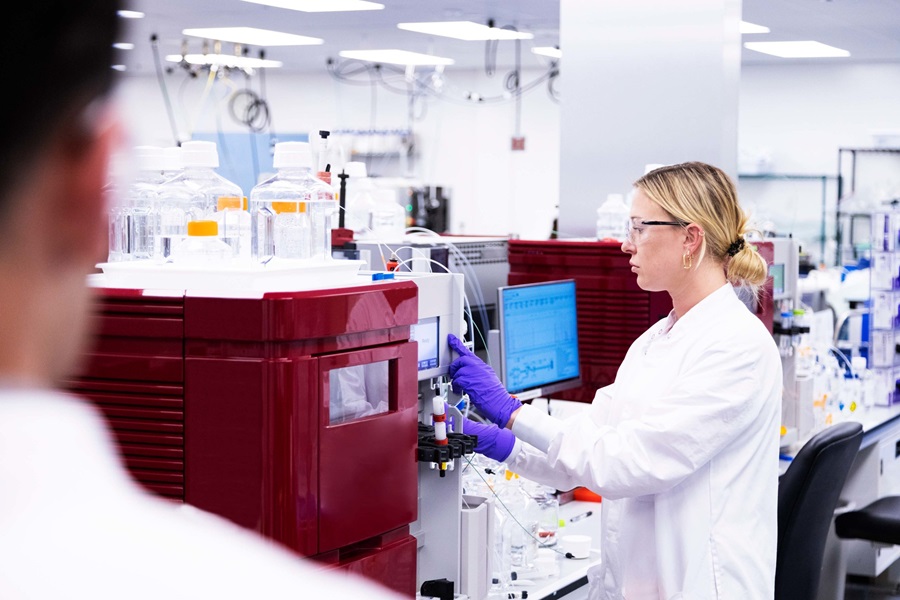Why Abzena?
Our focused approach.
Process development is the backbone of biopharmaceutical manufacturing. It involves refining and optimizing the steps needed to produce a biological drug safely, efficiently, and to the highest quality. At Abzena, both upstream and downstream process development are crucial parts of our service offering that ensure that the therapies we help bring to market are of the highest quality standard made from the most efficient process to meet the needs of our customers. In this blog, our Sr. Director of Process Development, Jennifer Hopp, explores key aspects of process development and how we leverage our expertise to accelerate drug development timelines.
A platform process consists of a series of predefined steps and parameters that have been proven to yield high-quality products, particularly in the early stages of clinical development. For antibody production, platform processes are especially valuable. They draw on a wealth of experience and data from similar projects to significantly reduce the time and effort needed for process development activities.
At Abzena, our platform process for monoclonal antibodies (mAbs) is precise and accurate, allowing us to focus more on confirming that a product fits within the established parameters rather than starting from scratch. This approach not only saves time but also ensures consistency and reliability in product quality.
The path to IND can take time, but process development can help expedite this journey, even for next generation, non-antibody biologics. Techniques such as high-throughput screening technologies and Design of Experiments (DOEs) – a statistical tool commonly applied to guide optimal process development – are critical in speeding up this process. High-throughput screening technologies allow for the rapid testing of different conditions and parameters, gathering a vast amount of analytical data early in development. DOE further refines this process by statistically optimizing experimental designs, helping to pinpoint the best conditions quickly.
Abzena’s approach combines these tools with our platform processes, enabling us to accelerate the development timeline while maintaining the necessary focus on product quality and safety.
Monoclonal antibodies, especially those of the IgG type, are well-suited for platform processes because of their similar chemical properties. Many FDA-approved therapies, like antibody fragments (fAbs) and bispecifics, also fit well into these platforms. However, some products may need custom steps to address specific impurities.
At Abzena, we have extensive experience in developing both standard and custom processes. We assess each product to determine if our platform is the best fit, and if not, we create a tailored process development strategy to meet the specific quality targets. Our vast experience allows us to efficiently apply successful strategies to new projects.
The biotech industry is constantly evolving, and new technologies are at the forefront of this change. Advances in materials, equipment, and artificial intelligence (AI) are opening new possibilities for making process development faster, more efficient, and more cost-effective. For example, new filtration technologies can reduce the number of purification steps needed, and AI simulated in silico process development, uses high volumes of qualitative data and methods for the analysis and modeling of multi-product spanning process data1 to optimize processes, which dramatically reduces development timelines and costs in ways that were previously unimaginable. By understanding and integrating such advanced tools, there is potential to analyze complex biological systems more precisely, leading to more effective process optimization.
At Abzena, we actively seek out and incorporate these new technologies into our processes. By staying on the cutting edge, we can offer our customers more efficient development pathways, ultimately helping to bring their products to patients more quickly and at a lower cost.
Scalability is a critical aspect of process development. A process that works well in the lab must be able to be scaled up to produce larger quantities for manufacturing of the product without losing quality or consistency. This requires meticulous planning and optimization at every step.
At Abzena, our process development teams work hand-in-hand with our manufacturing teams to ensure that the processes we develop can be scaled effectively. This collaboration allows us to identify potential challenges early and adjust the process accordingly, ensuring that when it’s time to move to large-scale production, the transition is smooth and successful.
Process development is essential for any program that aims to produce a biologic product at a scale suitable for clinical trials and beyond. Without it, there’s a risk of inconsistent product quality, which can lead to delays or failures in clinical testing. Moreover, a well-developed process ensures that production is cost-effective, reducing the overall expense of bringing a drug to market.
Abzena’s process development services are designed to support your program from early development through to large-scale clinical and commercial manufacturing. Our expertise ensures that your product is not only safe and effective but also produced in the most efficient and scalable way possible.
The development of biologics is a multi-step process that requires close collaboration between upstream, downstream, and analytical teams. Upstream development focuses on optimizing cell culture and production parameters, while downstream development handles the purification and refinement of the product. Analytical method development supports both by providing the tools and data needed to monitor product quality throughout the process.
At Abzena, our teams work together seamlessly to ensure that each aspect of process development is aligned. This collaboration is key to advancing biologics development efficiently, ensuring that every step of the process is optimized for success.
At Abzena, our comprehensive approach combines cutting-edge technologies, deep expertise, and collaborative partnerships to ensure that each product is developed with precision and efficiency. We’re committed to delivering high-quality results that accelerate timelines and meet the standards necessary for successful commercialization.
If you’re interested in exploring how our process development services can support your biologic program, we invite you to reach out to us. Whether you’re in the early stages of development or preparing for large-scale manufacturing, our team is here to provide the expertise and solutions needed to advance your project.
Reference:
